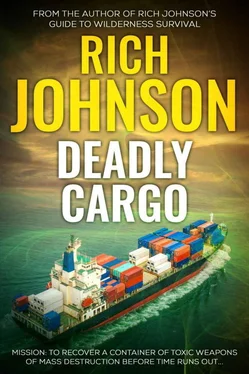Pfister was already unfastening his seatbelt. “Everybody off while she’s being refueled. Safety regs.”
Josh and Pfister exited the helicopter, followed closely by the pilot, co-pilot, engineer and rescue swimmer. They were shown the way forward along the ship’s side deck, climbed a flight of stairs and stepped into the nav station. The pilot busied himself with the logbook from the chopper, and the rest of them were handed cups of coffee by one of the young crewmembers.
The crewman who had led them to the nav station approached Pfister. “Fifteen minutes, and we’ll have you back in the air, sir. We’ve begun refueling already.”
“Very good,” Captain Pfister said, lifting the steaming cup to his lips. Then he turned to Josh. “We’re half way there. The Dolphin’s operational range is 360 nautical miles. Of course, that’s with a built-in safety factor. It’ll get us to the Desdemonda and then back here for another refuel.”
“Not knowing what we’re going to find out there,” Josh said, “I might need as much as a couple of hours.”
“No problem. We’ll shut down the chopper and strap her down on top of the most stable-looking stack of containers. From the aerial photos, it looks like most of the cargo is still in fairly good shape. She’s on the back side of the storm now, and even though there’s still a lot of wave action where she is, we probably won’t see waves above ten or twelve feet; a ship that size will have a pretty slow rate of pitch and roll.”
“Do we just show up unannounced?”
“Of course, we haven’t been able to contact the ship’s commander by long-range communications yet. But when we get within five miles or so we’ll try to raise the captain by VHF. They should have some hand-held marine band VHF radios on the bridge, and those units will still be intact, since their antennas are built in. Failing that, when we circle the bridge a couple of times he’ll get the message that we’re going to come aboard.”
“What will they do about their radios?”
“Now that the storm has passed, I expect that the ship’s engineer, communications officer and electrician will be working on repairs to the antenna array. I have no idea how much damage was done to the rest of their navigation system. They might need to be escorted back to Colon for major repairs.”
The door swung open and the young crewman poked his head inside. “All set, sir. You can board when you wish.”
Pfister tossed the empty foam cup into the waste bin, straightened his cap and nodded to Josh on his way out the door. “Time to fly.”
More than an hour into the second leg of the flight, Pfister pushed the helmet mic up in front of his mouth. “Mr Adams.” Josh looked up from the packet of photos he was studying. “Everything I said back there was assuming that there are still people alive on the Desdemonda.”
The thought struck Josh like a clap of thunder. “What are you saying?”
Pfister shook his head slowly. “Wouldn’t be the first ghost ship in these waters.”
“Ghost ship?”
“Maritime history is full of them, and every one is a mystery that leads folks to speculate about piracy or mutiny and abandonment of the ship. Or maybe a horrible storm that batters a ship so badly the crew are lost overboard while trying to escape in a life raft and they all drown. Or they are injured and die aboard, and by the time the ship is found there’s nobody left alive.”
That was all he said, then he leaned back and looked off into the distance as the sea rushed by below, leaving Josh to dwell on the subject of ghost ships. There was nothing to see. Cloud cover overhead was high and broken in places, and the drone of the rotors began to put Josh’s mind into a trance. Without warning, the earphones in his helmet suddenly crackled to life with the pilot’s voice. “I’m showing a ship-sized blip on the radar, sir.”
Pfister pushed the mic to his mouth. “How far out?”
“I’m on the 48-mile scale, and it just showed up. Time to target?”
“Twenty one minutes, sir.”
“At fifteen miles out, begin trying to raise the bridge on VHF. Maybe there’s a hand-held turned on.”
“Aye, sir.”
Josh pressed his helmet against the window, but couldn’t see forward well enough to spot anything, so he sat back and waited. The chopper bounced in turbulence caused by residual wind behind the great storm. The eye was more than 100 miles away and moving to the northwest, but the chopper was gaining on the powerful swirling winds and the closer they got, the bumpier the ride. The helmet came to life again. “Sir, I’ve got contact with the C-130. They’re circling and shooting more photos.”
Pfister moved the mic again. “What’s their report?”
“No visible signs of life on board. The ship is not moving, it’s just sitting in place, except for the drift of current.”
“Maybe they lost their engines, damaged the wheels or lost steerage. Has the C-130 done a low and slow fly-by?”
“I’ll ask, sir.” The pilot switched off his intercom and talked with the pilot of the C-130. In a moment, he was back on the helmet phones. “No, sir. The closest he’s flown is half a mile at an altitude of twelve hundred feet.”
“Tell him I’m requesting a low and slow, and as close in as he can safely maneuver. I want to wake up whoever is onboard that ship.”
“Aye, sir. We’re at twenty miles now, sir.”
Josh looked at his watch. In ten minutes they’d be circling the container ship themselves, and with any luck a few minutes later he’d be standing on deck. A buzz in his cargo pocket alerted him to an incoming call, and he dug for the satellite phone, flipped the antenna up and looked at the display. It was Curt Delamo. He quickly stripped off the helmet and held the phone to his ear. “Curt!” Josh shouted above the sound of the rotors and jet engine. “What’s up?”
“Where are you?”
“In a chopper, just about to land on the deck of the Desdemonda. What have you got for me?”
“Good news and bad – the worst.” Delamo’s voice trailed off.
“Bad first, then,” Josh shouted.
“Susan’s hurt. Alicia Gomez was blown away. A head shot. Susan caught the bullet after it exploded Gomez’s head. Luckily it was a small caliber round. We figure it was a soft hollow-point that was crosscut to be more lethal. It flared when going through the window, flared more as it passed through Alicia Gomez’s head, but still had enough momentum to do considerable damage to Susan. She’s expected to live, but she might lose her left eye.”
Josh reeled at the news. He and Susan had been together for a long time, and their relationship went well beyond their work. He dropped his head into his hands, overwhelmed.
“Josh, you there?” Delamo’s voice came over the phone.
Slowly, Josh raised the phone back to his ear. “Yeah, I’m here.”
“The good news is that she’s still alive. I’m betting the terrorist shooter thought he got them both. It was bloody, and they were both down in the seat. So the sniper evidently left the scene thinking he killed Susan as well.”
Josh could hardly catch his breath. He threw his head back and forced himself to inhale deeply, then he blew it out and talked into the phone again. “I’m glad she’s alive. But when we catch the bas—”
“Don’t let it get personal!” Delamo’s voice was sharp. “You do that and you’ll lose focus and end up making mistakes. I know how you feel about Susan. But don’t let this tear you down. Do I need to bring you in and send out a replacement?”
The chopper banked and started a low circle around the ship. From the window, Josh saw the bow and the disorganized pile of containers that were once stacked precisely and locked together. He exhaled hard. “No. I’ll be fine. Who’s taking care of Susan?”
Читать дальше












